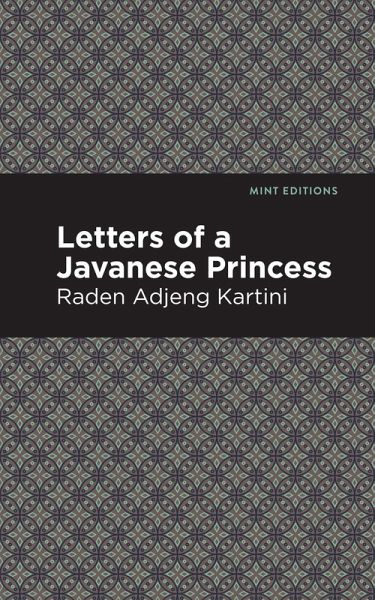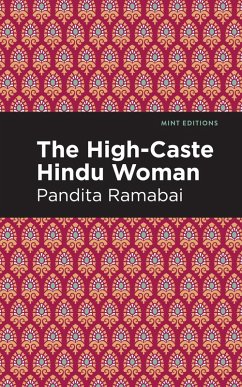
Letters of a Javanese Princess (eBook, ePUB)
Versandkostenfrei!
Sofort per Download lieferbar
5,99 €
inkl. MwSt.
Weitere Ausgaben:

PAYBACK Punkte
3 °P sammeln!
Letters of a Javanese Princess (1921) is a collection of letters by Indonesian political activist and national hero Raden Adjeng Kartini. Written over the last several years of her life to friends and acquaintances in the Netherlands, Kartini's letters illuminate the mind of a young woman with a deep understanding of the political and personal ramifications of injustice in her native Java.For a young woman without access to a formal education, Raden Adjeng Kartini managed to combine a remarkable empathy for those suffering under an oppressive regime with an incredibly effective willpower to es...
Letters of a Javanese Princess (1921) is a collection of letters by Indonesian political activist and national hero Raden Adjeng Kartini. Written over the last several years of her life to friends and acquaintances in the Netherlands, Kartini's letters illuminate the mind of a young woman with a deep understanding of the political and personal ramifications of injustice in her native Java.
For a young woman without access to a formal education, Raden Adjeng Kartini managed to combine a remarkable empathy for those suffering under an oppressive regime with an incredibly effective willpower to establish herself as a leading political thinker in her country. Decrying the influence of opium on Indonesia's poor, she criticizes the influence of European civilization on its colonial possessions: "Civilization is a blessing, but it has its dark side as well. The tendency to imitate is inborn, I believe. The masses imitate the upper classes, who in turn imitate those of a higher rank, and these again follow the Europeans." Not only is European influence a cause of cultural loss, it creates a demand, in one specific case, for such products as opium, pressuring the Indonesian government to allow its use and sale despite the harm it imposes upon its people. Throughout her letters, Kartini presents a nuanced, balanced critique of both Indonesian society's oppressive treatment of girls and women-a lack of education, forced marriages-and the detrimental consequences of European conquest and cultural assimilation. Letters of a Javanese Princess is a powerful record of one woman's commitment to many, an invaluable resource for scholars of colonialism, and a fascinating text for readers looking to familiarize themselves with the life of a national hero.
This edition of Raden Adjeng Kartini's Letters of a Javanese Princess is a classic of Indonesian literature reimagined for modern readers.
Since our inception in 2020, Mint Editions has kept sustainability and innovation at the forefront of our mission. Each and every Mint Edition title gets a fresh, professionally typeset manuscript and a dazzling new cover, all while maintaining the integrity of the original book.
With thousands of titles in our collection, we aim to spotlight diverse public domain works to help them find modern audiences. Mint Editions celebrates a breadth of literary works, curated from both canonical and overlooked classics from writers around the globe.
For a young woman without access to a formal education, Raden Adjeng Kartini managed to combine a remarkable empathy for those suffering under an oppressive regime with an incredibly effective willpower to establish herself as a leading political thinker in her country. Decrying the influence of opium on Indonesia's poor, she criticizes the influence of European civilization on its colonial possessions: "Civilization is a blessing, but it has its dark side as well. The tendency to imitate is inborn, I believe. The masses imitate the upper classes, who in turn imitate those of a higher rank, and these again follow the Europeans." Not only is European influence a cause of cultural loss, it creates a demand, in one specific case, for such products as opium, pressuring the Indonesian government to allow its use and sale despite the harm it imposes upon its people. Throughout her letters, Kartini presents a nuanced, balanced critique of both Indonesian society's oppressive treatment of girls and women-a lack of education, forced marriages-and the detrimental consequences of European conquest and cultural assimilation. Letters of a Javanese Princess is a powerful record of one woman's commitment to many, an invaluable resource for scholars of colonialism, and a fascinating text for readers looking to familiarize themselves with the life of a national hero.
This edition of Raden Adjeng Kartini's Letters of a Javanese Princess is a classic of Indonesian literature reimagined for modern readers.
Since our inception in 2020, Mint Editions has kept sustainability and innovation at the forefront of our mission. Each and every Mint Edition title gets a fresh, professionally typeset manuscript and a dazzling new cover, all while maintaining the integrity of the original book.
With thousands of titles in our collection, we aim to spotlight diverse public domain works to help them find modern audiences. Mint Editions celebrates a breadth of literary works, curated from both canonical and overlooked classics from writers around the globe.
Dieser Download kann aus rechtlichen Gründen nur mit Rechnungsadresse in A, D ausgeliefert werden.












